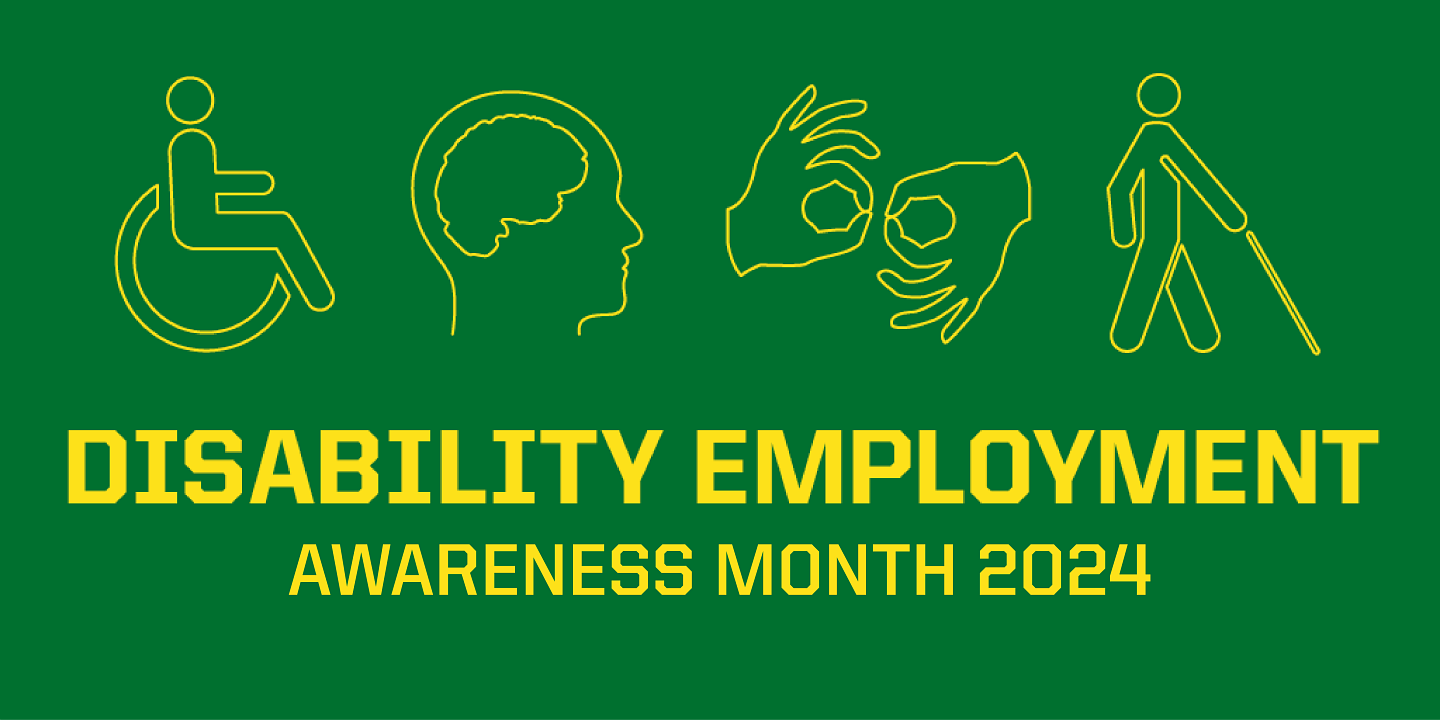
National Disability Awareness Month 2024: Workplace Equity Benefits Everybody
October is National Disability Employment Awareness Month (NDEAM), a month dedicated to celebrating the value and talent Americans with disabilities contribute to our nation’s workplaces and economy. This year’s theme, “Access to Good Jobs for All,” reminds us that everyone, regardless of ability, deserves an opportunity to prepare for, obtain and succeed in meaningful employment. It began in 1945, when Congress enacted a law declaring the first week in October each year “National Employ the Physically Handicapped Week.” In 1962, the word “physically” was removed to acknowledge the employment needs and contributions of individuals with all types of disabilities. In 1988, Congress expanded the week to a month and changed the name to National Disability Employment Awareness Month.
The University of Oregon recognizes disability as an aspect of diversity that is integral to the university and to society. We also understand that maintaining an inclusive environment for Ducks with disabilities, seen or unseen, contributes to our collective strength and allows us to flourish. We believe that we flourish when the contributions of employees and students with disabilities are valued. Here are some ways the university supports Ducks with disabilities throughout the year:
Digital accessibility is an ethical imperative, a University Policy requirement, and a federal legal obligation. Maintaining this ensures that everyone at the university who creates, edits, or distributes digital content is responsible for ensuring that it is accessible to people with disabilities.
The Office of Human Resources helps facilitate reasonable workplace accommodations for applicants and employees with disabilities. The office also empowers employees with disabilities through the Disability Accommodation Process Guide. The guide provides information regarding the process for requesting workplace accommodations and related considerations to mitigate disability-related limitations.
Students with disabilities can connect with our Career Center for information on campus organizations, grants and scholarship information and careers, including connecting them to the Job Accommodation Network (JAN). This free consulting service provides information about job accommodations, the Americans with Disabilities Act (ADA), and the employability of people with disabilities.
The Accessible Education Center (AEC) is dedicated to facilitating and supporting accessible education through access and full inclusion. In collaboration with the AEC, instructors play a key role in facilitating academic accommodations allowing students with disabilities to engage with course material equitably. We encourage allies to review AEC’s Tips for Interacting with People with Disabilities.
The Workforce Recruitment Program is a federal recruitment and referral program that connects employers with college students and recent graduates with disabilities who are eager to demonstrate their skills in summer or permanent jobs. Interested students are encouraged to set up an appointment with UO Career Center’s career readiness coach Chelsey Niles.
For specific ideas about how you, your department, students, or personal network can support National Disability Employment Awareness Month, visit dol.gov/NDEAM. The State of Oregon will feature a free webinar series all month long.
Every effort works towards fostering a more accessible, inclusive and equitable workforce, one where all people are recognized for their abilities—every day of every month. We believe that when we challenge pre-existing notions of “belonging” — in every crevice of the academy and the larger world — we flourish. To become a true place of belonging, we must seek to expand our understanding of disability rights. This includes raising our individual and collective awareness of the barriers that prevent inclusion.
This month I encourage you to reflect on the words of celebrated musicians Itzhak Perlman who said, “Every person with disability is an individual,” and Stevie Wonder who said, “We need to make every single thing accessible to every single person with a disability.” I continue to be inspired by these great artists and every individual who lives, perseveres and achieves in spite of disability. Lastly, I’d like to highlight the good work of our Disability Studies Interdisciplinary Minor students who are committed to creating equity in the workforce. May we continue to develop a more nuanced understanding of how disabled individuals move through their daily lives. Acknowledging their lived experiences with L.A.C.E. allows us to be an example for other institutions to follow as we move towards a more just and inclusive world.
